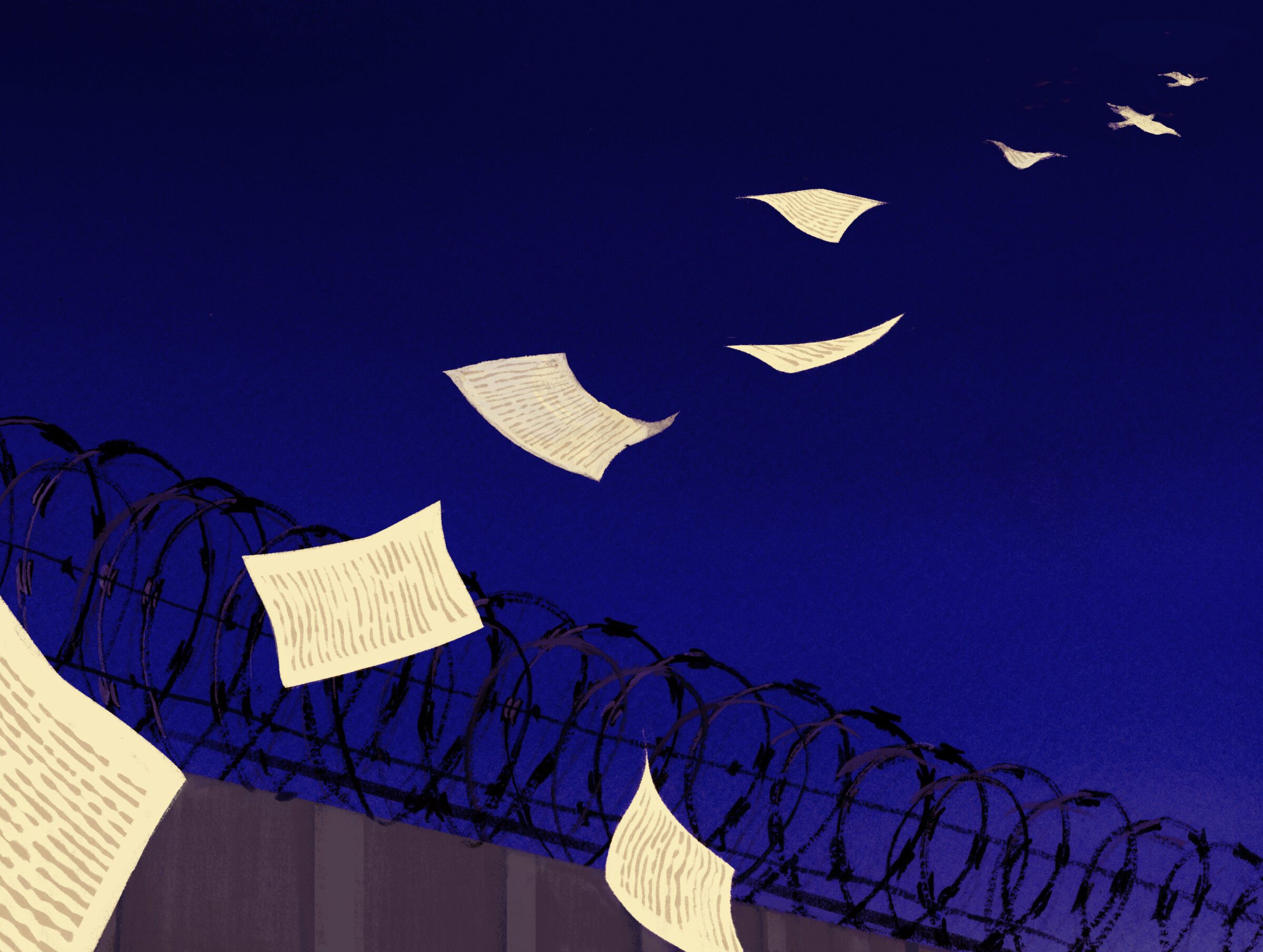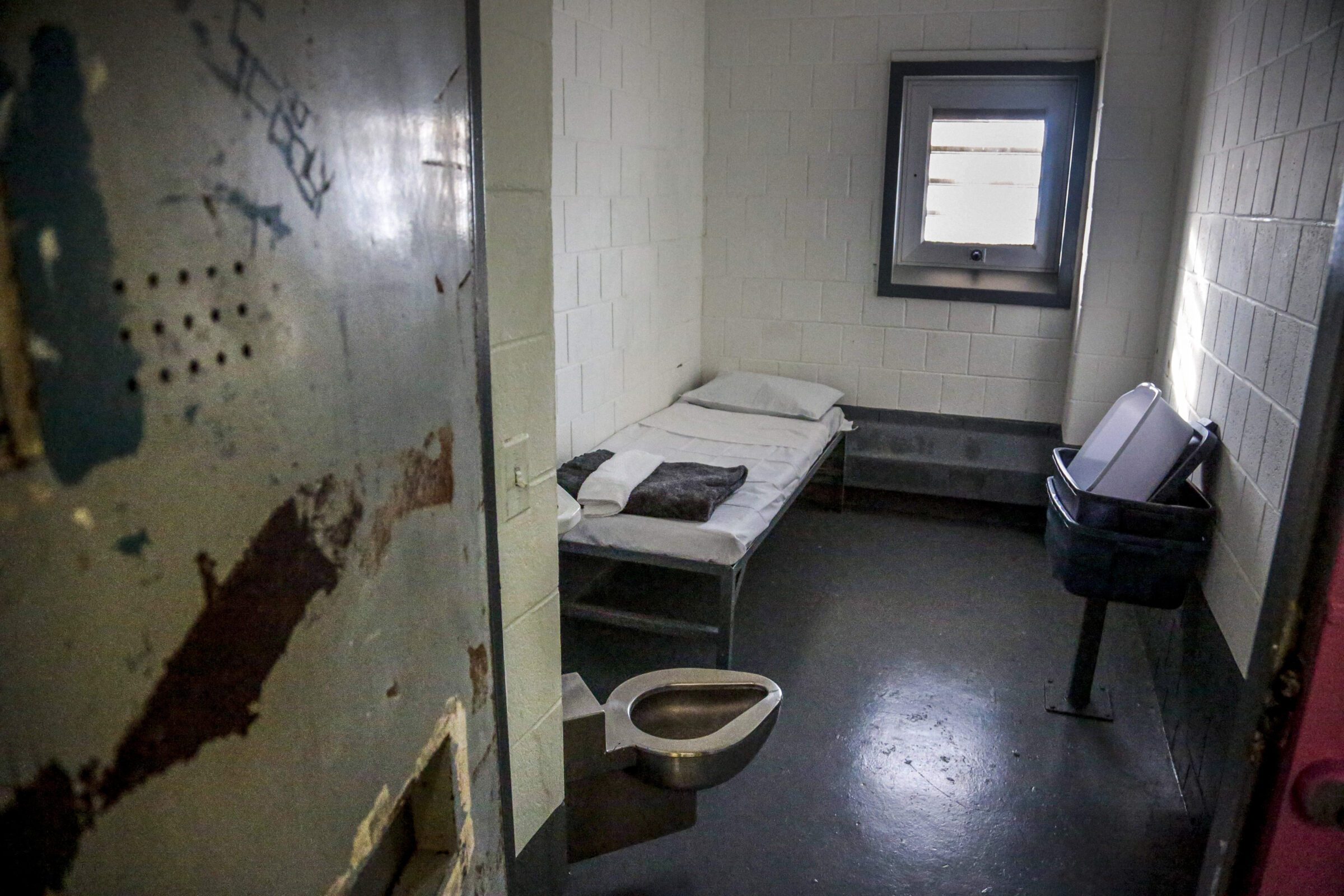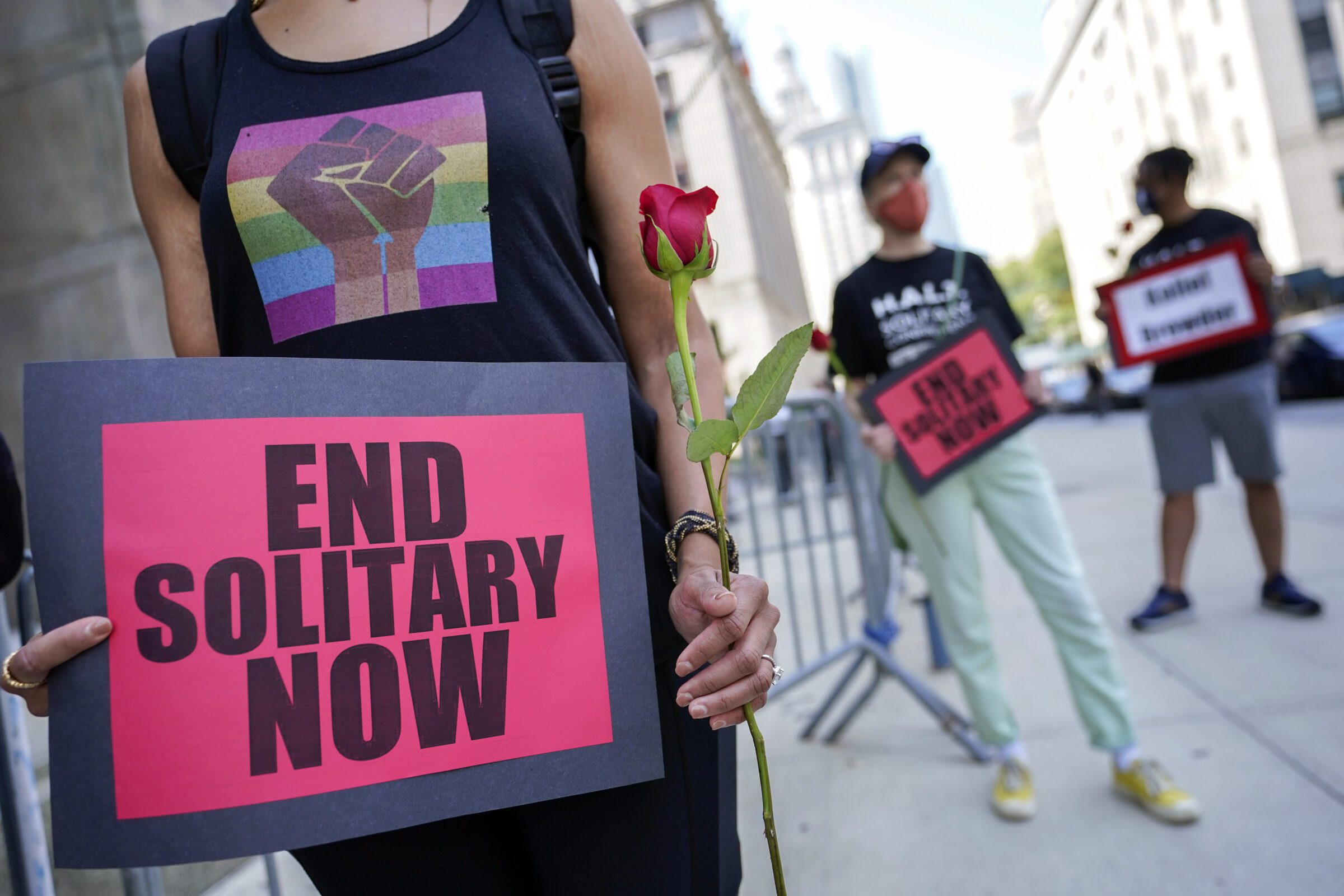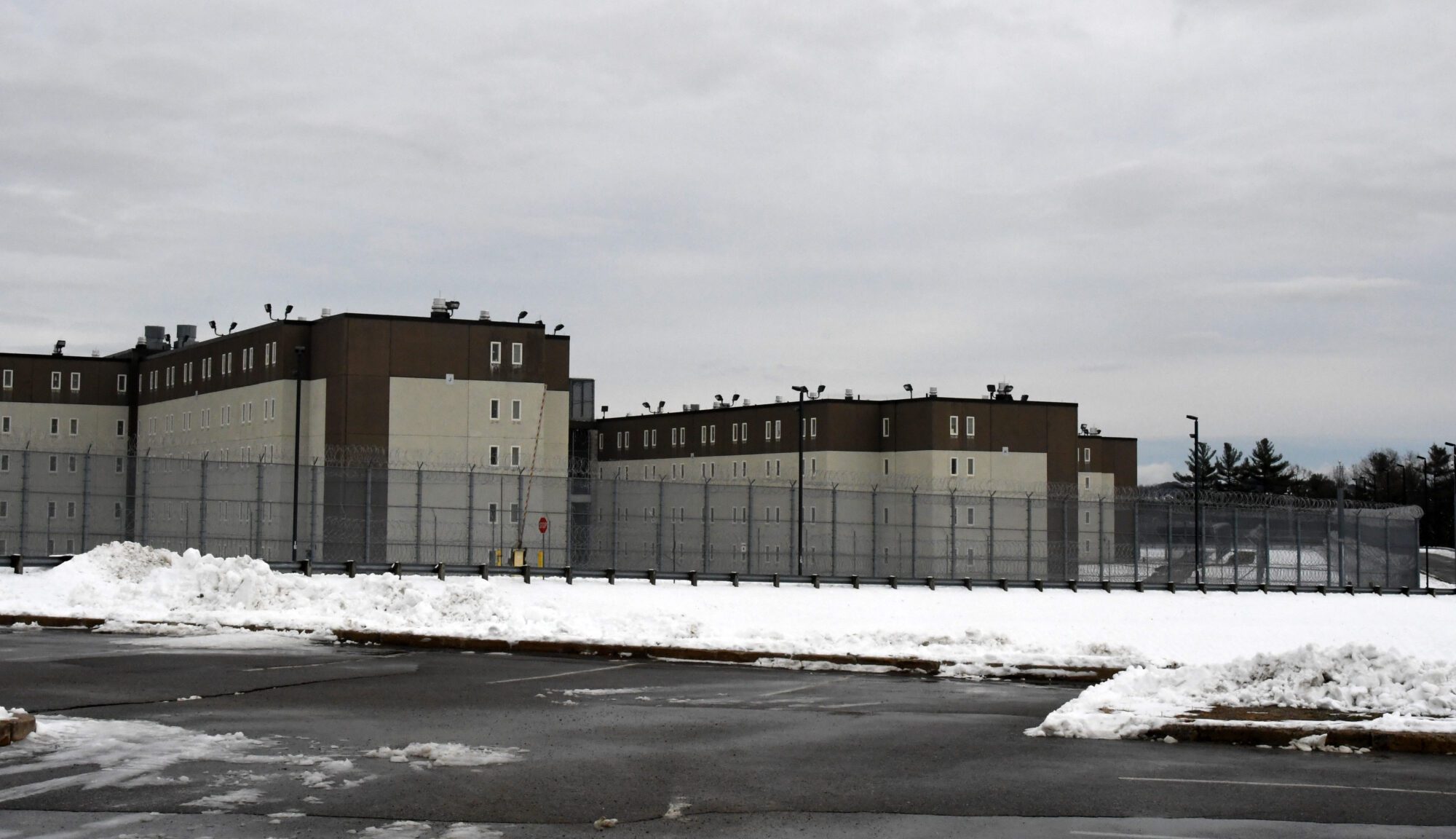“Designed to Break You:” Two Incarcerated Writers on the Heavy Toll of Solitary Confinement
The authors of a new book on solitary answer your questions about their experiences with isolation and the movement to end the torturous practice.
| September 19, 2025

Isolating people inside a small, closet-like cell for weeks, months, and even years on end remains common inside this country’s prisons and jails, even though the United Nations defines the practice as torture. Experts say this extended isolation and deprivation of human contact causes profound and lasting damage, but proposals to restrict it routinely derail in state legislatures or when the time comes to implement reforms.
Kwaneta Harris and Christopher William Blackwell, incarcerated journalists who have personally experienced solitary confinement, wrote a new book about its widespread use and the activism against it, Ending Isolation: The Case Against Solitary Confinement, along with law professor Deborah Zalesne and psychiatrist Terry Kupers.
The book features the voices of many currently and formerly incarcerated people who describe the effects of solitary confinement on prisoners and how advocates are continuing to fight it. It documents decades of legal and psychological research on the harms caused by solitary.
We invited our readers to send questions for Harris and Blackwell, as part of our series Ask Bolts, and we heard from many of you who wanted to learn about their experiences and writing.
Blackwell and Harris respond to nine of your questions about solitary confinement.
You can navigate to the question that most interests you here, or scroll down to explore them all:
Is solitary confinement used to punish or protect?
Do you know how long you’ll be in solitary confinement when you’re there?
What physical and mental effects does solitary have on prisoners?
How does one build up resiliency in solitary confinement?
Do you have access to books and writing materials?
How does solitary affect people’s return to the outside world?
What should lawyers know about working with people who’ve experienced solitary confinement?
How were you able to write the book from prison?
Keep reading to hear more from Harris and Blackwell about the harms of solitary confinement on incarcerated people and their thoughts on what alternatives prisons should adopt.
In your experience, was solitary doled out to protect people from the person in solitary or to punish the person in solitary? –@highlandsurfer on BlueSky
Christopher Blackwell: No matter how you look at solitary, it can ONLY be viewed as punishment. I say that because solitary is a form of torture. To put a person in a box without human contact does nothing to keep them or others safe—it only prolongs future harm. It does nothing to address the reasons why they were harming people in the first place. Solitary is always to punish through abuse and oppression. But no one stays in solitary forever, just like over 90 percent of people are eventually released from prison. What’s it going to look like when that person gets out after weeks or months of even years of torture? They’re probably going to keep harming others.
Kwaneta Harris: It’s punishment, plain and simple. Don’t let them fool you with that “administrative segregation” language. It’s designed to break you down. I’ve seen women thrown into solitary for refusing a guard’s sexual advances, for filing grievances about medical neglect, for being gay or trans and not conforming to the administration’s idea of femininity. I watched them put a woman in the hole for 2 years because she asked for a kosher meal she was legally entitled to. Another woman got solitary for “threatening” behavior. What she did was tell a guard she was going to file a complaint with the warden about being denied her heart medication. The system uses isolation as its ultimate weapon of control, and they wield it against anyone who dares to maintain their dignity or fight for basic human rights.
Even if we accept solitary confinement is very damaging for most imprisoned people, are there certain people who pose a true danger to others in prison? And if so, are there alternatives to solitary confinement for them? –Judy, from Rhode Island | Do you believe that there is any circumstance in which solitary is appropriate? If so, what? –Vivi, from Washington
Blackwell: There is no way but to accept that solitary is very damaging to all humans forced to endure it. This is a scientific fact that has been proven over and over. While there are people who do, at times, pose true danger to others, harming them further will do nothing to stop that. The alternatives are working to help that individual who is causing harm to see and understand the impact of their actions. Often people do this because they are living in what I call “survival mode.” If we were to build programs and help people deal with unprocessed traumas and offer resources to heal from those traumas, we would quickly see a change in that person’s interactions within their community. Hurt people, hurt people. Solitary is never appropriate. Is torture ever appropriate? There might be times where people need a “cool off” period, but that should be short lived and then corrections should start a process towards getting someone to be accountable for their actions.
Harris: In women’s prison, the real danger comes from the guards — the ones who rape us, who deny us medical care, who retaliate when we speak up. But yes, there are women who struggle with violence, and it’s usually because they’re drowning in untreated trauma. The answer isn’t throwing them in a concrete box for years; it’s trauma-informed care, therapeutic communities, mediation programs, restorative justice practices. I’ve seen women transform when given proper mental health treatment, when they’re in programs that address the root causes of their pain instead of just punishing the symptoms. We could have crisis intervention units with trained mental health professionals, peer support programs, even separate housing units that still allow human contact and programming. But do I believe there’s any circumstance where solitary is appropriate? Absolutely never. There is always a more humane alternative.
Do they tell you how long you’ll be in solitary confinement when you’re there? If you don’t know, how does that feel, to wait? How do you pass time? –Joan, from California
Blackwell: I can’t think of a single time I was told how long I would be in solitary confinement. You are simply taken there and expected to wait. If you ask for a timeline, you’ll receive an answer like, “just be patient, things in here run slow, it takes time…” The feeling of not knowing is torture on its own. You have no clue what you’re expected to endure, leaving you to simply exist. You pass time by digging into the deepest corners of your mind. Which can often be dangerous, because the majority of people in solitary have extremely traumatic backgrounds. This time forces one to process issues that one should never do on their own. It is a space that should only be described as a psychological minefield.
Harris: No. In Texas, you get “reviewed” every six months, but it’s a kangaroo court. When we arrive for the review, the denial forms are already filled out; we just sign to acknowledge we were told “no.” They never tell you what you need to do to get out or when you might be released. Ask when you’re getting out and they’ll tell you, “When we say so.” I watched friends get denied year after year because they were trans or gay and refused to grow their hair to what the system deemed “feminine length.”
The not knowing eats at you. The first few reviews, you’re excited: this is it, they’re letting me out. But slowly it dawns on you they have no intention of releasing you when you start meeting people who’ve been in the hole for decades. Eventually you stop going to your reviews because you refuse to participate in their sick game. (Editor’s note: Lawsuits by people subjected to years and decades of solitary confinement in Texas prisons claim these perfunctory reviews reinforce a system of indefinite isolation.)
I passed time by reading everything I could get my hands on books, magazines, newspapers I had to purchase. NPR was my lifeline to the outside world. I developed a rigid daily routine and stuck to it religiously. I kept myself so busy I was exhausted because I was terrified of having even one moment that wasn’t occupied. I was afraid that if I had too much time to think, I’d follow my friends into that pit of life-ending depression that swallowed so many of us.

What effect does this experience have on your short and medium term physical and emotional health? –Sarah, from Oregon | Studies have shown that solitary is akin to torture and causes rapid decline in mental health. Did you experience this in solitary, and if so were you aware of it as it was happening or only later? –Vivi, from Washington
Blackwell: Solitary has severe effects on one’s physical and emotional wellbeing. It is something that just chips away at your core spirit, sometimes leaving a shell of a person when they are released from its grasp. I for sure experienced this in solitary throughout the many experiences I’ve survived—starting at the age of 12-years-old! You’re never aware of the damage that’s taking place while in solitary, at least I couldn’t tell. But once I was released and I found myself in a crowded space or someone touched me, it was quickly apparent that being isolated all that time had a severe effect on me.
Harris: Studies show people in prison age faster than their biological age due to extreme stress or what researchers call “weathering.” Nearly a decade in solitary without natural sunlight caused partial blindness in my right eye. No opportunities to exercise in that tiny space gave me all the problems of a sedentary lifestyle. I became overweight, suffered bone loss, developed foot problems from rarely wearing shoes, got carpal tunnel from all that writing, and lost hearing from the constant noise level.
Emotionally, I became desensitized to violence. My social skills deteriorated—I have to consciously remind myself to follow appropriate social cues in conversations. I will never be the same person I was before. I still have nightmares that I’m back in there. I was aware of my mental decline as it happened. I lived in a constant state of hypervigilance and hyperawareness, and when you’re that heightened for years, cognitive decline inevitably follows.
How does one build up resiliency in solitary confinement? I am sorry you had to experience this. Thank you for your work to educate the rest of us. –Roxanne, from New Mexico
Blackwell: The only way I found to build anything resembling resiliency was to try and create a schedule to live by, hoping to add some sense of normalcy. Wake up early, make my bed, do a basic workout, eat lunch, write a letter, read for an hour, etc. You have to find a way to keep your mind from slipping into the dark corners that isolate and depress you. Otherwise, you’ll slowly start to lose yourself. But, for me, the most impactful thing was to remain in close contact with loved ones, phone calls and letters whenever possible. The problem is, many people in solitary have no outside support to keep them grounded.
Harris: It’s a process that starts with grief: mourning everything you’ve lost, including your right to be treated as a human being. But after witnessing so much sexual violence and suicide, that grief transformed into anger, and that anger fueled my resilience. I refused to let our deaths and rapes be in vain. That’s what kept me fighting.
Are you allowed to read and/or write and, presumably, offered books and writing materials for use? –Dana, from New Jersey | How did the corrections officers/warden handle your mail and correspondence while in solitary? What access to books/media/literature did you have or a legal library? –Addy, from Pennsylvania
Blackwell: Writing and reading can be a huge way to maintain some mental stability while in solitary. But what you can and can’t have varies from prison to prison. Books provided by the prison are usually weathered and torn, often missing pages or full of nasty comments written by someone who’s struggling. When books and other materials are sent in by loved ones, they are always delayed and held up from getting to you. Content is also over-censored and the amount you can have in your cell is limited—allowing prison guards to steal photos, books and other writing materials from cells during their searches. Often you have very limited access to media as most solitary cells don’t have TVs or radios, and access to law libraries is limited into what you can ask for through a prison kite system—think snail mail, but much slower.
Harris: We could request one book a week from the library, but no matter what genre we asked for, the librarian only sent back religious books. My family sent me books and set up magazine subscriptions, though most magazines went online so I had to find ones that still offered print editions. The legal library came three times a week, but you had to request specific case numbers that nobody tells you and nobody knows by heart.
They handled our mail however they wanted, sometimes throwing it away, ripping it up, or just not delivering it. We had to create decoys and send real mail under other people’s names, or give letters to people being released to mail once they got out. Sometimes we even enlisted corrupt officers involved in inappropriate relationships to help circumvent their official channels.

Does solitary make it harder for people to return to the outside world and stay out of the justice system? –Coby, from New York
Harris: Absolutely. I’ve lost so many friends who went straight from solitary to the streets without any reintegration or counseling who committed suicide within the first two years because it was too overwhelming. Others sleep in bathtubs, under beds, or in closets because that closed-in space is what feels familiar to them now.
Blackwell: Solitary 100 percent makes it harder to return to society as productive members. It creates a deep-seeded hate and distrust for the system and all connected to it. When you struggle to function in a healthy way around others, things like holding a steady job, or attending college become almost impossible. This usually leads people to go back to ways that often lead them to come into contact with the criminal legal system as they strive to survive financially and emotionally.
I’m a young lawyer. What do you want lawyers to know about working with people who have experienced solitary confinement? Is there a time you felt particularly seen by the legal system, or a time you felt particularly ignored? –Emily, from Maryland
Blackwell: That the traumas we’ve experienced in solitary are part of what holds us back from rebuilding our lives and functioning in society in a healthy way. I NEVER felt seen by the legal system. I’ve always been just another number or statistic.
Harris: Treat your interaction with that person as if you would with a prisoner of war. Because that’s what we are.
I’ve felt particularly erased by the legal system my entire life. Courts that rubber-stamp solitary placements, judges who won’t even look at you when you’re shackled and brought in from the hole, attorneys who see you as just another case file instead of a human being fighting for survival.
Congratulations on your book! How were you able to write it from prison? Have you faced punishments or threats for that? –Patrick, from Ohio
Harris: My brilliant co-authors Terry Kupers and Debbie Zalesne did all the heavy lifting. I just shared my truth and they helped bring it to the world.
Have I faced punishment for speaking out? I’m always in some state of being punished, having been punished, or about to be punished. They’re already retaliating against us for this work. But at least now it’s for a good reason: to make sure no one else has to endure what we’ve survived in those concrete tombs they call justice.
Blackwell: It took a village of my brothers and sisters inside and our commUNITY of supporters who refused to sit by and let us be tortured. Incarcerated writers always face punishment. It varies how it’s done, but it is always there. Your mail might be tampered with, cell continuously searched, visitors targeted, or a trip to solitary. But the alternative of not sharing these harms is unthinkable to me and many like me, so we refuse to be silent no matter what the cost!
Sign up and stay up-to-date
Support us
Bolts is a non-profit newsroom that relies on donations, and it takes resources to produce this work. If you appreciate our value, become a monthly donor or make a contribution.




